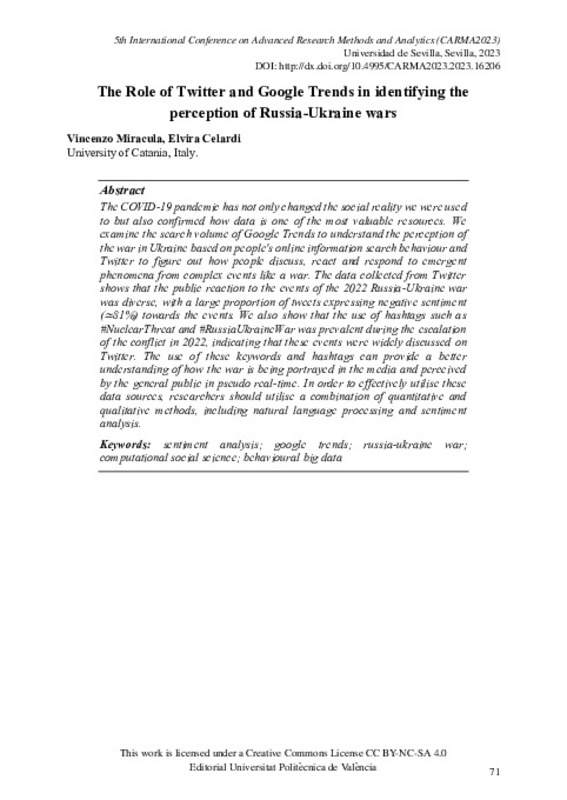JavaScript is disabled for your browser. Some features of this site may not work without it.
Buscar en RiuNet
Listar
Mi cuenta
Estadísticas
Ayuda RiuNet
Admin. UPV
The Role of Twitter and Google Trends in Identifying the Perception of Russia-Ukraine Wars
Mostrar el registro sencillo del ítem
Ficheros en el ítem
| dc.contributor.author | Miracula, Vincenzo
|
es_ES |
| dc.contributor.author | Celardi, Elvira
|
es_ES |
| dc.coverage.spatial | east=31.16558; north=48.379433; name=Ucraïna | es_ES |
| dc.coverage.spatial | east=37.6173; north=55.755826; name=Rússia | es_ES |
| dc.date.accessioned | 2024-01-11T13:06:12Z | |
| dc.date.available | 2024-01-11T13:06:12Z | |
| dc.date.issued | 2023-09-22 | |
| dc.identifier.isbn | 9788413960869 | |
| dc.identifier.uri | http://hdl.handle.net/10251/201800 | |
| dc.description.abstract | [EN] The COVID-19 pandemic has not only changed the social reality we were used to but also confirmed how data is one of the most valuable resources. We examine the search volume of Google Trends to understand the perception of the war in Ukraine based on people's online information search behaviour and Twitter to figure out how people discuss, react and respond to emergent phenomena from complex events like a war. The data collected from Twitter shows that the public reaction to the events of the 2022 Russia-Ukraine war was diverse, with a large proportion of tweets expressing negative sentiment (≃81%) towards the events. We also show that the use of hashtags such as #NuclearThreat and #RussiaUkraineWar was prevalent during the escalation of the conflict in 2022, indicating that these events were widely discussed on Twitter. The use of these keywords and hashtags can provide a better understanding of how the war is being portrayed in the media and perceived by the general public in pseudo real-time. In order to effectively utilise these data sources, researchers should utilise a combination of quantitative and qualitative methods, including natural language processing and sentiment analysis. | es_ES |
| dc.format.extent | 10 | es_ES |
| dc.language | Inglés | es_ES |
| dc.publisher | Editorial Universitat Politècnica de València | es_ES |
| dc.relation.ispartof | 5th International Conference on Advanced Research Methods and Analytics (CARMA 2023) | |
| dc.rights | Reconocimiento - No comercial - Compartir igual (by-nc-sa) | es_ES |
| dc.subject | Sentiment analysis | es_ES |
| dc.subject | Google trends | es_ES |
| dc.subject | Russia-ukraine war | es_ES |
| dc.subject | Computational social science | es_ES |
| dc.subject | Behavioural big data | es_ES |
| dc.title | The Role of Twitter and Google Trends in Identifying the Perception of Russia-Ukraine Wars | es_ES |
| dc.type | Capítulo de libro | es_ES |
| dc.type | Comunicación en congreso | es_ES |
| dc.identifier.doi | 10.4995/CARMA2023.2023.16206 | |
| dc.rights.accessRights | Abierto | es_ES |
| dc.description.bibliographicCitation | Miracula, V.; Celardi, E. (2023). The Role of Twitter and Google Trends in Identifying the Perception of Russia-Ukraine Wars. Editorial Universitat Politècnica de València. 71-80. https://doi.org/10.4995/CARMA2023.2023.16206 | es_ES |
| dc.description.accrualMethod | OCS | es_ES |
| dc.relation.conferencename | CARMA 2023 - 5th International Conference on Advanced Research Methods and Analytics | es_ES |
| dc.relation.conferencedate | Junio 28-30, 2023 | es_ES |
| dc.relation.conferenceplace | Sevilla, España | es_ES |
| dc.relation.publisherversion | http://ocs.editorial.upv.es/index.php/CARMA/CARMA2023/paper/view/16206 | es_ES |
| dc.description.upvformatpinicio | 71 | es_ES |
| dc.description.upvformatpfin | 80 | es_ES |
| dc.type.version | info:eu-repo/semantics/publishedVersion | es_ES |
| dc.relation.pasarela | OCS\16206 | es_ES |








